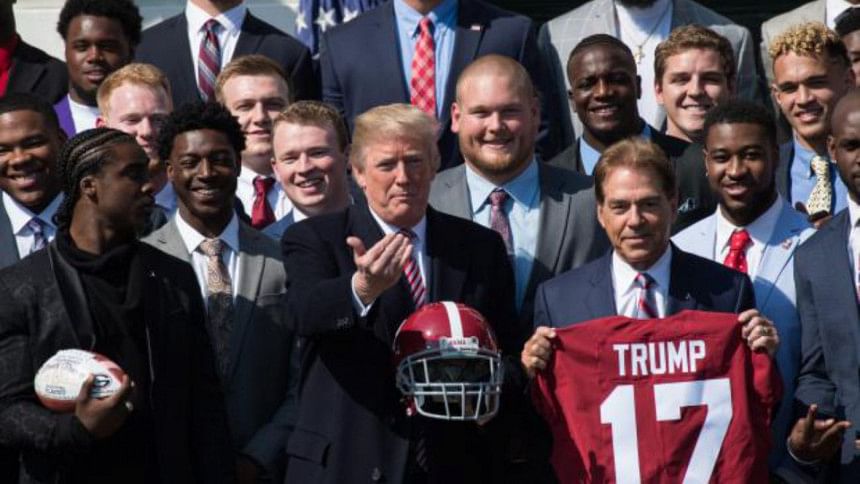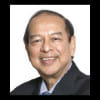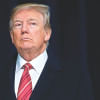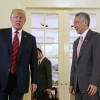The New World Disorder: We must learn to live with it

A fundamental law of physics, also applicable to the social sciences, is that everything in nature is in a state of flux. The sage Heraclitus had said we never step into the same river twice. The flow of the river of life today has remarkably gained a momentum that is torrential. It gushes ahead washing away old values, norms, and the societal architecture that human mind and endeavour had conceived and created over a long period of time. As it leads us into the digital post-modern era dominated by big data, cloud-computing, and artificial intelligence, it also impacts on the politics, economics and sociology of how we organise our lives.
It is without doubt that a major factor of change in our socio-political and economic life today, President Donald Trump, the leader of the world's most powerful nation, the United States. He is relentlessly adding kinetic energy speeding up the motion. But did not make a sudden appearance. Ex Nihilo nihil fit—nothing comes from nothing. Mr Trump, with his disturbingly erratic and seemingly irrational behaviour, is the product of decades of domestic and global developments. These are those that are both within America and in the world beyond. In the nineteenth-century America believed it had a "manifest destiny", ordained by God. It was not only to expand its territorial dominion westward, but also spread democracy and capitalism throughout North America.
Across the Atlantic, in Europe, the present was being shaped by the past. The Treaty of Westphalia of 1648 created nation-states. The French Revolution of 1789 sparked nationalism with its positive and negative ramifications. Germany, a somewhat late entrant to European civilisation, burst upon the unfolding history with its enormous contributions in literature, mathematics and philosophy. The "Protestant Reformation" of Martin Luther, supplanted orthodox Catholicism, igniting the spirit of enquiry. It also laid the foundation sciences and a new work ethic. Eventually a scattered Germanic nation became united under Bismarck. Meantime other European nations—Spain, Portugal, Holland and England—were dividing up the world between themselves. Freshly empowered, Germany now demanded its "platzan der Sonne"—"a place in the sun", including its own colonies.
The result was two disastrous world wars. America, the "new world", was called out to aid the "old" Europe. Thereafter, to rebuild it on the ashes of the conflagrations. Through the Marshall Plan and the establishment of the Bretton Woods Institutions (World Bank, International Monetary Fund), the United Nations, and the World Trade Organization, it helped create "a new World Order". It helped set the norms and standards for trade, arms control, and international relations. The "Manifest Destiny" now moved eastward. The opposing Communist ideology of the Soviet Union was confronted and ultimately vanquished. The winner was capitalism, buttressed by free trade and liberal values. America was now the "city on the shining hill", the unparalleled "hyper-power".
Then several things happened. First, unsurprisingly, hubris set in. Its military misadventures, in Iraq and Afghanistan, led to immeasurable damage to the respect and reputation it had acquired. Second, its strategic nuclear-weapon superiority was now deterred not just by Russia, but also China. Third, it incurred huge deficits in trade with its partners, with many now seeing commerce as a "zero-sum game". Finally, other nations were rapidly emerging in capabilities and in particular China. Its new-found wealth and capacity, spurred on by President Xi Jinping's "ZhungGuomeng" or China Dream, were being rapidly translated into power. The American sociologist, Andre Gunder Frank, remarked that what he feared more was not so much the rise of China, as America's response to it.
America was now exhausted. Middle America, the redneck white working classes, distressed by the widening gulf between them and the elite, thought they were paying a heavy price , economically and militarily, for their so- called "leadership of the free world". Enter Donald Trump. He was thrown up by this constituency, small, but consistent and powerful. He promised to tear up the rulebooks of traditional conduct, put "America First" and make it "Great" again. He pulled America out of past agreements, challenged the very institutions that America had created, and sought to renegotiate America's engagements with the rest of the world. America was not necessarily disengaging from the world. Rather, it was re-engaging with its perceived self-interest, on new terms. It now preferred to do it bilaterally, where it was strong, rather than multilaterally, where it felt weak and constrained by rules. To America there was no longer "friends" or "foes". Only "others". Idealism had yielded to realism. Lord Palmerston of Britain had once, in a moment of pique vis-à-vis his continental peers, had reportedly remarked that God had made a mistake when He made foreigners. Mr Trump actually seemed to believe it.
So, is the old global order giving way to a New World Disorder? Perhaps. Some fear that there may be chaotic consequences that would be unmanageable. But chaos need not necessarily be bad. For instance, ancient Greeks perceived it positively. To them it was the dark void of space, the primeval state of existence, from which the four elements of nature—air water, earth and fire, and eventually divine and human forms emerged. Today we see disruption as providing the necessary fillip to technological innovation. Trump's actions may be perceived as doing the same on the political matrix. Possibly in a dialectical fashion, the "disorder" that we "confront" would eventually synthesise into another order, a newer methodology for the interrelationship of peoples and nations.
For most countries, including those in our own region, South Asia, these developments may presage a return to the classical form of "balance of power". Henry Kissinger has endeavoured to educate the contemporary times on it. It entails that no nation is supremely dominant. Each is left to calculate its imperatives of power, and accordingly, align itself with or oppose other nations. No one would be an a priori ally or antagonist forever.
For countries like Bangladesh, as for other smaller South Asian countries, it would mean the need for nimble diplomacy. Linkages would need to be constructed on the merits of specific issues. It is important to bear in mind, that even if America at the highest levels disengage, at operational levels, where its interests are not critical, its field functionaries like its diplomats may be landed with a greater role. This is why we see America sanction, on recommendations from its agents in the field, Myanmar generals for their alleged atrocious perpetration of inhumane violence upon the "Rohingyas" in the Rakhine State.
Nevertheless, South Asia, as well as other regions, must know that it can no longer routinely draw on external state-actors to make up the power gaps with adversarial neighbours. It is a key point to bear in mind for our leaderships in this election period in Pakistan, Afghanistan, Maldives, Bangladesh and India. These countries would be well advised to renegotiate their intramural relationships. They must aim to ease tensions among themselves to be better able to confront the world with collective interests. They must be able to help themselves, as no one else will.
The global trends cited earlier will not alter substantively even after Trump leaves office. He is not the cause but the effect of the changes. The "New World Disorder" will eventually become a new normal, which will become yet another "New World Order". For now, however, the "disorder" has come to stay. The rest of the world has no option but to recognise, readapt and respond to the changing times.
Dr Iftekhar Ahmed Chowdhury is a former foreign adviser to a caretaker government of Bangladesh and is currently Principal Research Fellow at the Institute of South Asian Studies, National University of Singapore.










Comments